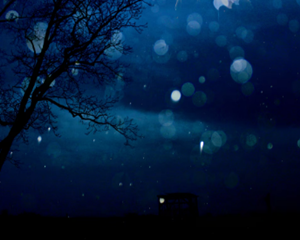"It's fairly accepted that the trigger is a short photoperiod -- the number of hours from dawn to dusk," says Rohan. "It's the strongest predictor of when the symptoms begin."
“人们普遍认为触发因素是短光周期--从黎明到黄昏的小时数,”罗汉说。“这是症状何时开始的最强预测因素。”
But why, exactly, does less daylight seem to make some people clinically depressed?
但到底为什么日光不足看起来会让某些人出现临床抑郁症呢?
"That's the million-dollar question," says Rohan.
“这是一个价值百万美元的问题,”罗汉说。
One leading theory is that the change in daylight disrupts our bodies' release of melatonin, a hormone the brain releases every night to promote sleep.
一个主要理论是,日光的变化会扰乱我们身体褪黑激素的释放,褪黑激素是大脑每晚释放的一种促进睡眠的荷尔蒙。
The process is part of our circadian rhythm, our innate biological clock dictating when we sleep and wake.
这个过程是我们昼夜节律的一部分,我们的先天生理时钟决定了我们何时睡觉和醒来。
Our clocks are cued up by morning light, but as the supply of daylight dwindles in winter, melatonin may be released later and wear off later, the theory suggests.
该理论表明,我们的生理时钟是通过晨光来调动的,但随着冬季日光供应的减少,褪黑激素可能会较晚释放并逐渐消失。
That means, "that alarm clock might be going off in the morning, but the body is still in a state of biological night," says Rohan.
这意味着,“闹钟可能会在早上响起,但身体仍处于生物夜间状态,”罗汉说。

Those diagnosed with SAD may be particularly sensitive to schedules that disrupt their circadian rhythm by beginning and ending at odd hours, like shift work, she adds.
她补充说,那些被诊断患有季节性情感障碍的人可能对在奇怪的时间开始和结束的日程安排特别敏感,例如轮班工作,从而扰乱了他们的昼夜节律。
Even given that theory, she says it's still unclear why disrupted circadian rhythm can lead to depression, instead of just feeling fatigued.
她表示,即使考虑到这个理论,目前仍不清楚为什么昼夜节律紊乱会导致抑郁,而不仅仅是感到疲倦。
Rohan says a minority of people who experience SAD in the winter can become manic in the summer when the number of stimulating daylight hours increases.
罗汉说,少数在冬天经历季节性情绪失调的人在夏天,当刺激的白天时间增加时,可能会变得躁狂。
But still others experience a phenomenon called summer SAD, or when seasonal depression symptoms occur only in the summer -- perhaps triggered by the heat and humidity.
但还有一些人经历了一种称为夏季SAD的现象,即季节性抑郁症症状仅发生在夏季--可能是由炎热和潮湿引发的。
Instead of feeling lethargic, summer SAD patients more often feel irritable and agitated.
夏季SAD患者不会感到昏昏欲睡,反而更容易感到烦躁和不安。
Scientists are studying whether temperatures rising as a result of climate change may harm mental health.
科学家正在研究气候变化导致气温上升是否会损害心理健康。
A 2018 study of mood expressed on social media found depressive language increased with temperature.
2018年对社交媒体上表达的情绪进行的一项研究发现,抑郁性语言会随着温度的升高而增加。













